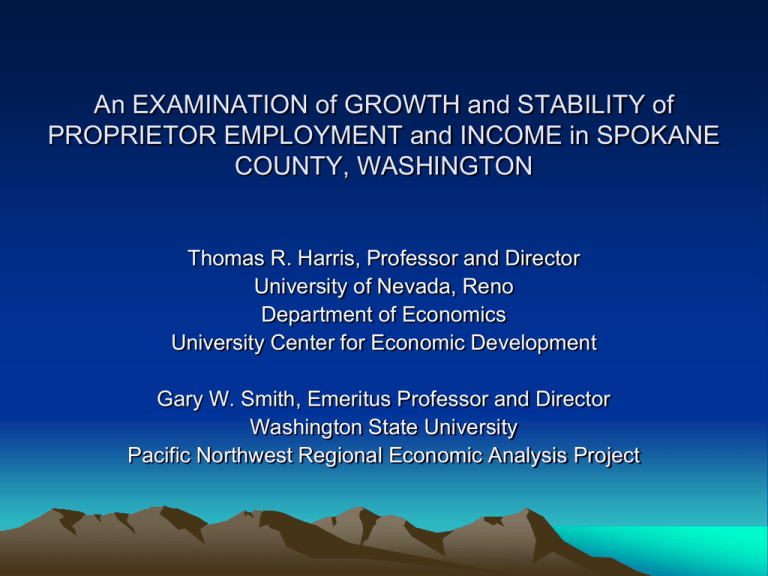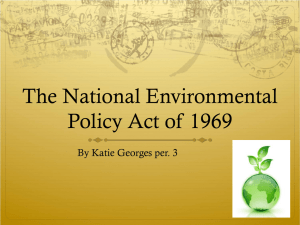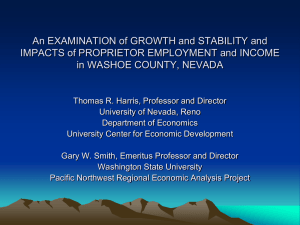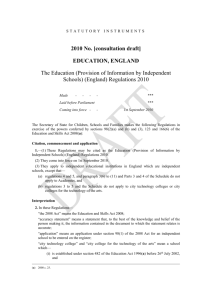An Examination of Growth and Stability of Proprietor Employment
advertisement

An EXAMINATION of GROWTH and STABILITY of PROPRIETOR EMPLOYMENT and INCOME in SPOKANE COUNTY, WASHINGTON Thomas R. Harris, Professor and Director University of Nevada, Reno Department of Economics University Center for Economic Development Gary W. Smith, Emeritus Professor and Director Washington State University Pacific Northwest Regional Economic Analysis Project FOUR OPTIONS FOR RELEASED WORKERS 1. Leave Spokane County 2. Become employed in another economic sector, probably at a lower pay scale, in Spokane County or an adjacent county and continue to live in Spokane County 3. Become unemployed and continue to live in Spokane County 4. Become self-employed in Spokane County as sole proprietor or a partner in a business. BEA PROPRIETOR DESIGNATION • The number of self-employed are calculated for each county by the U.S. Bureau of Economic Analysis (U.S. Department of Commerce, 2013) using federal tax Form 1040 (Schedule C) for sole proprietorships and Form 1065 for partnership data Figure 1. Index of Total Proprietorship Numbers for the Nation, State of Washington and Spokane County, 1969 to 2011, Where 1969 = 100.0. Figure 2. Real Proprietorship Income Per Proprietor for the Nation, State of Washington and Spokane County, 1969 to 2000. 1996 = 100.00. Measurement of Entrepreneurial Activity • Employment Growth (%), 1969-2011 • Average Earnings Per Job ($), 2011 • Per Capita Income ($), 2011 • Ratio of Number of Proprietors to Number of Wage and Salary Workers, 2011 • Ratio of Proprietor’s Income to Wages and Salaries, 2011 • Percentage Growth in Number of Proprietors, 1969 to 2011 • Average Income Per Proprietor, 2011 • • Percentage Growth in Average Income for Proprietor, 1969 to 2011 Table 2. Classification of County or Region Entrepreneurship Activity. USING CLASSIFICATION FOR WASHINGTON COUNTIES • Ten (10) counties exhibit “Entrepreneurship of Necessity”. • Fourteen (14) counties are classified in the largest category of “Strong Job Growth and Strong Entrepreneurship.” • Twelve (12) counties are categorized as “Strong Job Growth and Weak Entrepreneurship. • Three (3) counties are categorized as “Weak Economies and Weak Entrepreneurship.” • Spokane County can be classified as “Strong Job Growth and Weak Entrepreneurship.” Table 3. Real Percentage Growth by Major Sources of Personal Income, Recession and Expansion, Spokane County, Washington, 2002-2009. Table 4. Major Sources of Personal Income by Percent for Spokane County, Washington. CONCLUSIONS • With loss of jobs from “The Great Recession” and the downsizing of employment by large corporations, entrepreneurships are an area of economic development to keep workers in Urban America. • Following national and state trends, Spokane County proprietorship numbers increased from 1969 to 2011. • In real dollars (2005=100.0), real proprietor income per proprietor remained fairly constant decreasing slightly from $27,391 in 1969 to $27,321 in 2011. For the state of Washington, real proprietor income per proprietor decreased from $29,359 in 1969 to $27,517 in 2011. Also, for Spokane County real proprietor income per proprietor declined from $25,751 in 1969 to $17,593 in 2011 CONCLUSIONS • Following an Economic Development Administration publication for gauging local and regional proprietorship activity, it was judged that Spokane County is a “Strong Job Growth and Weak Entrepreneurship” area. This means that Spokane County from 1969 to 2011 had an employment growth rate higher than the national average and the ratio of entrepreneurs to workers was less than the national average. Given that income per proprietor in Spokane County is lower than the national or state average, public education programs in small business development could be advantageous in the county. • For entrepreneurial development, it is important for Spokane County decision makers to understand factors which enhance or retard regional entrepreneurships formation and growth. CONCLUSIONS • Investigating the characteristics of the cyclical performances of the major categories, Proprietor Income exhibited a very definite cyclical pattern of behavior by declining at a -6.28% average annual growth rate during contraction and at a -0.06% average annual growth rate during expansion. This results in a positive cyclical swing measure for Proprietor Income of 6.22%. • As may be anticipated given the intended purpose of certain Transfer Payments for unemployment and income maintenance programs, Transfer Payments exhibited extreme counter-cyclical behavior with a cyclical swing of -7.06%. Public policies suggesting reducing “Transfer Payments” would have intensified the impacts of the “Great Recession” in Spokane County, Washington CONCLUSIONS • As a share of total personal income, Wages and Salaries declined from 64.15% in 1969 to 52.73% in 2011. Also Proprietor Income share declined from 10.41% in 1968 to 5.98% in 2011. Dividends, Interest, and Rents increased as a share of total personal income by a factor of 1.2 (14.80% to 18.12%) while Transfer Payments increased by a factor of 2.1 (10.63% to 23.18%). • The response indices for Wages and Salaries, Proprietor Income, and Transfer Payments are significant but for Dividend, Interest, and Rents are insignificant. Thus, for Wages and Salaries, Proprietor Income, and Transfer Payments in Spokane County, Washington, one cannot say that response index for these variables are different from zero. However, Dividends, Interest, and Rents in Spokane County, Washington exhibit a pattern of growth that did not correspond with the cyclical performance of the national economy.









